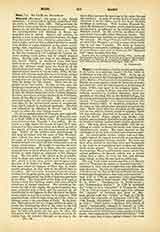

Mann, THEODORE AUGUSTINE, English naturalist and historian, b. in Yorkshire, June 22, 1735; d. at Prague in Bohemia, February 23, 1809. Little is known of his education except that he seems to have imbibed deistic ideas in his youth. He left England about 1754 and went to Paris. Here the study of Bossuet’s “Discours sur l’histoire universelle” exerted a profound influence upon him, and in 1756 he was received into the Catholic Church by the Archbishop of Paris. Upon the outbreak of the war between France and England in the same year, he went to Spain, where he enlisted in a regiment of dragoons, and afterwards became a student at the military academy of Barcelona. He soon abandoned, however, the idea of a military career, and went to Belgium, where he entered the Chartreuse monastery at Nieuport, the sole English house of the order. After his profession his leisure was devoted to scientific study, and his memoir “Theorie des causes physiques des mouvements des corps celestes d’apres les principes de Newton”, won for him membership in the Imperial Academy of Brussels. He became prior of his monastery in 1764, but left the order thirteen years later, after having obtained a Bull of secularization and also the privilege of possessing a benefice. He took up his residence at Brussels, and received a prebend in the Chapter of Notre-Dame de Courtrai. In 1787 he was chosen perpetual secretary of the Brussels Academy, and carried on numerous meteorological observations under its auspices. The invasion of the French in 1794 forced him to leave Belgium, and, after traveling in Germany and England, he finally settled at Prague, where he continued his literary labors until his death. Mann was a laborious student and a versatile writer. He is said to have refused the Bishopric of Antwerp, offered him by Emperor Joseph II, rather than abandon his favorite studies.
His principal literary works, conspicuous for their erudition, were: “Memoire et lettres sur l’etude de la langue grecque” (Brussels, 1781); “Memoire sur la conservation et le commerce des grains” (Mechlin, 1764); “Abrege de l’histoire ecclesiastique, civile, et naturelle de la ville de Bruxelles et de ses environs” (Brussels, 1785), in collaboration with Foppens; “Histoire du regne de Marie Therese” (Brussels, 1781; 2nd ed., 1786); “Recueil de memoires sur les grandes gelees et leurs effets” (Ghent, 1792); “Principes meta-physiques des etres et des connaissances” (Vienna, 1807), and numerous papers in the “Memoires” of the Brussels Academy. He was also the translator of an English work, which was published under the title “Dictionnaire des Jardiniers et des Cultivateurs” (Brussels, 1786-9).
HENRY M. BROCK

